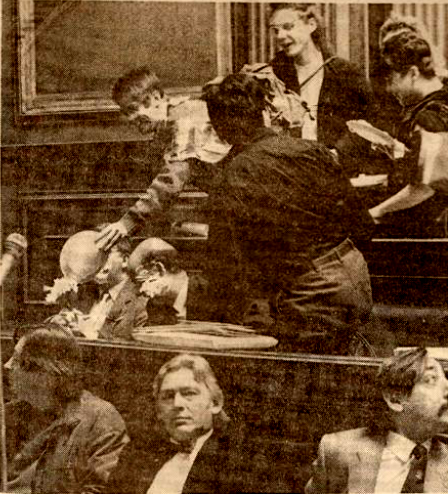Today I continue my scan through some of the material at The Sparrows’ Nest Library’s archive of Poll Tax resistance ephemera.
After the Poll Tax riots, some of the ostensible leadership of the anti-Poll Tax movement distanced themselves from the protesters and prioritized putting a respectable face on the movement by throwing those arrested under the bus. As a result, a grassroots defense movement almost immediately evolved to defend those arrested in the riots. One branch of this was the “Nottingham Defence Campaign” which took as its charter “to co-ordinate genuine support for all people arrested in Nottingham for whatever reason, and hopefully to come up with a defence strategy for future occasions.”
As of the first issue of its newsletter, dated , they were extending this support to fourteen people who were either arrested at the big Trafalgar Square demonstration or during a “Robin Hood” occupation of the Nottingham Council Chamber .
The latter demonstration was the one in which demonstrators had thrown “custard pies (made from shaving foam on paper plates)” at councillors who were implementing the Poll Tax. Some of the demonstrators were charged with assault and eventually sentenced to brief prison sentences. A later edition of the newsletter announced demonstrations at the council house and at the prison to protest the sentences.
Much of the work of the Defence Campaign was fundraising money to reimburse defendants for their expenses for travel to and attendance at trial. Some defendants had previously pled guilty simply because it was too expensive to travel to court regularly. From the looks of things, benefit concerts were the fundraising tool of choice. The newsletter issues advertised several such concerts.
The Nottingham Evening Post also covered the poll tax protests there. One article covered an occupation and lock-down of the City Treasurer’s office that took place on . Another covered the disruption of the Nottingham city council meeting in which “[s]ome two dozen demonstrators” — “many dressed as Robin Hood outlaws” — “broke into the Council House chambers, unfurled banners, hurled toilet rolls, and pushed paper plates full of shaving cream into the faces of some councillors.”
A follow-up article covered one Tory councillor’s claims that Robin Hood and his Merry Men had gotten inside help during their raid. “They must have been let in by someone. Their route was a narrow winding corridor which they could not have known about.”
Another follow-up reprinted the establishment spin that the protesters “were members of extreme political groups” and “simply rent-a-mob” (Britishese for “outside agitators”) as Labour and Tory politicians alike condemned the violence and urged people to protest ineffectually. Some details about the protests from that article:
The worst of the violence was in Bristol where police, facing missile-throwing protesters, drew batons and moved in on a crowd of about 500.
Twenty-one people were arrested and four police officers injured after crowds attempted to storm the Council House.
One of the biggest demonstrations was in Norwich where about 2,000 protesters stormed City Hall and forced the abandonment of the meeting.
Violence erupted in Birmingham when protesters invaded the city council buildings screaming abuse and waving banners.
The council meeting at Maidenhead was abandoned when a crowd of about 700 stormed the council buildings.
One of the Merry Men, John Cromby, was interviewed in a later paper and said he was not a member of any outside far-left groups and that the action, while carefully-planned, did not have the help of a council insider.
An Hackney protest against the poll tax descended into riot and looting, according to the Post. Protest actions mentioned in the article included a 1,000-person sit-down occupation, and hanging effigies of Prime Minister Thatcher.
The issue noted that a delivery driver had lost his job after refusing to deliver poll tax forms from the printer.
Mr [Russell] Burrows, 40, said he refused on principle to deliver the forms: “I don’t regret what I did.
It’s about time more people took a stand against the poll tax, it’s a rip-off.”

